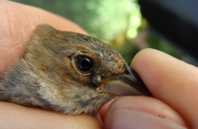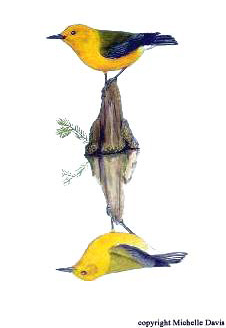
Tick infestations and their consequences for migratory songbirds during spring stopover
In preparation for migration, birds require a great deal of resources. While foraging
for those resources, birds may encounter parasites that are also in search of resources.
Ticks specifically have been noted on captured migrants for years. As parasites, one would
assume an additional loss of nutrients during such a critical time would negatively impact
migrants traveling hundreds of miles to their destination. By capturing and systematically
searching migrants in Johnson's Bayou, Louisiana, I hope to better understand the effects
that feeding ticks have on those birds attempting to rest and refuel. I am also interested
in the distribution of tick parasitism in migrants. Do ground foraging birds acquire more
ticks than canopy foraging birds? I am interested in how ticks affect these birds directly.
Does having an attached tick decrease physical characteristics such as muscle mass and fat
as compared to those birds that do not have ticks? Do ticks affect blood factors such as
hematocrit or immune and hormonal responses? As ticks feed on their various hosts' blood
they may acquire pathogens. I want to know if birds act as vectors for tick-borne disease
and if they are transporting ticks from the tropics. I believe that a better understanding
of parasite-host interactions among migratory birds will give better insight into disease
transmission and further understanding of the struggles that migrants face during their
seasonal journeys.
Background
I have always had a love for science, however choosing a field was difficult.Originally
an astrophysics major, I first became interested in biology as a transfer sophomore thanks
to a fantastic professor. My interest in birds developed while studying Tropical Ecology
in Belize in 2005. I became truly enthralled in biology while working as an undergraduate
TA in the freshman labs at USM. I then worked with Zoltán Németh in the Migratory Bird
Research Group studying seasonal phenotypic plasticity in gray catbirds (Dumetella
carolinensis) from 2006-2007.
|
